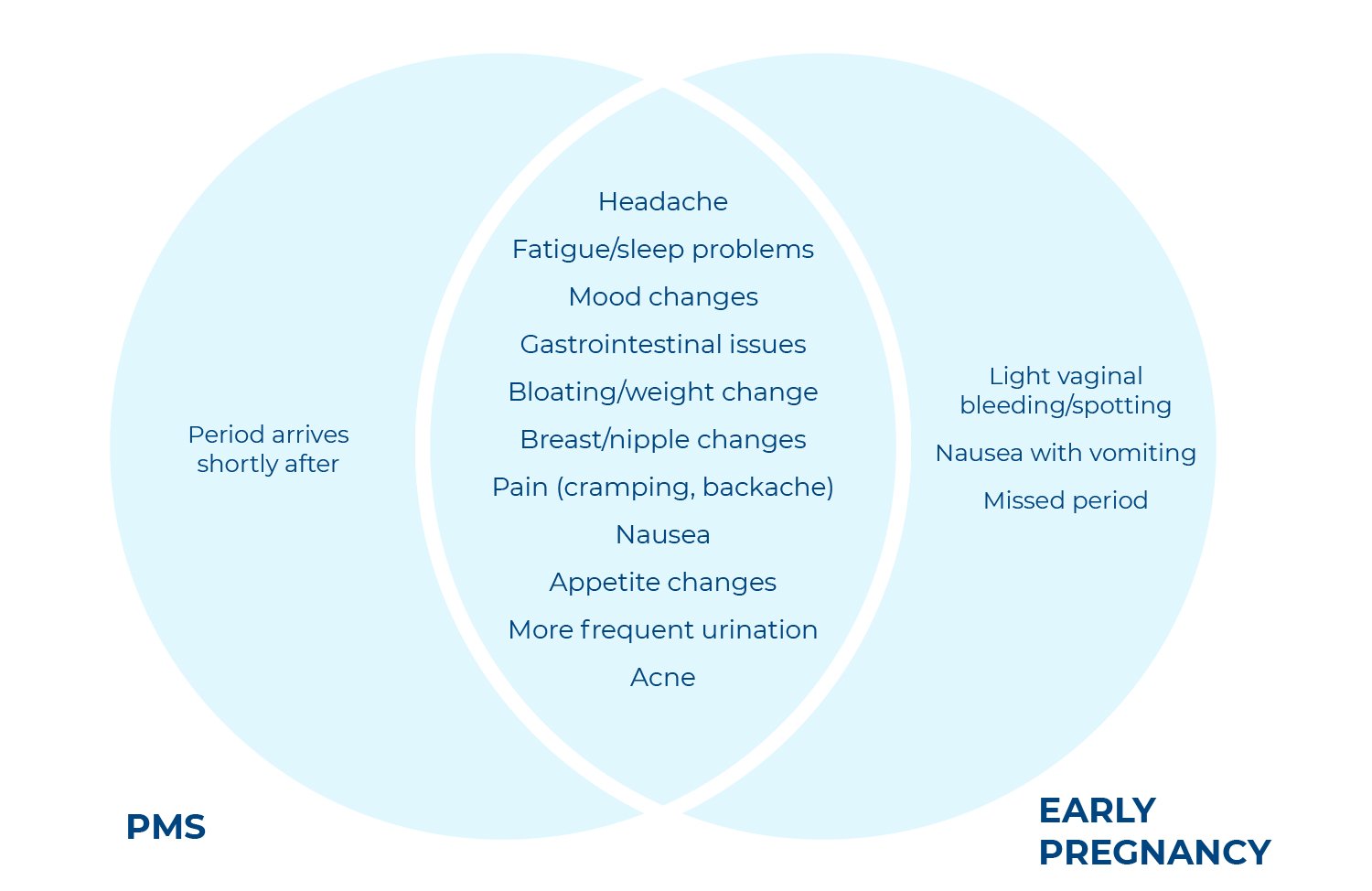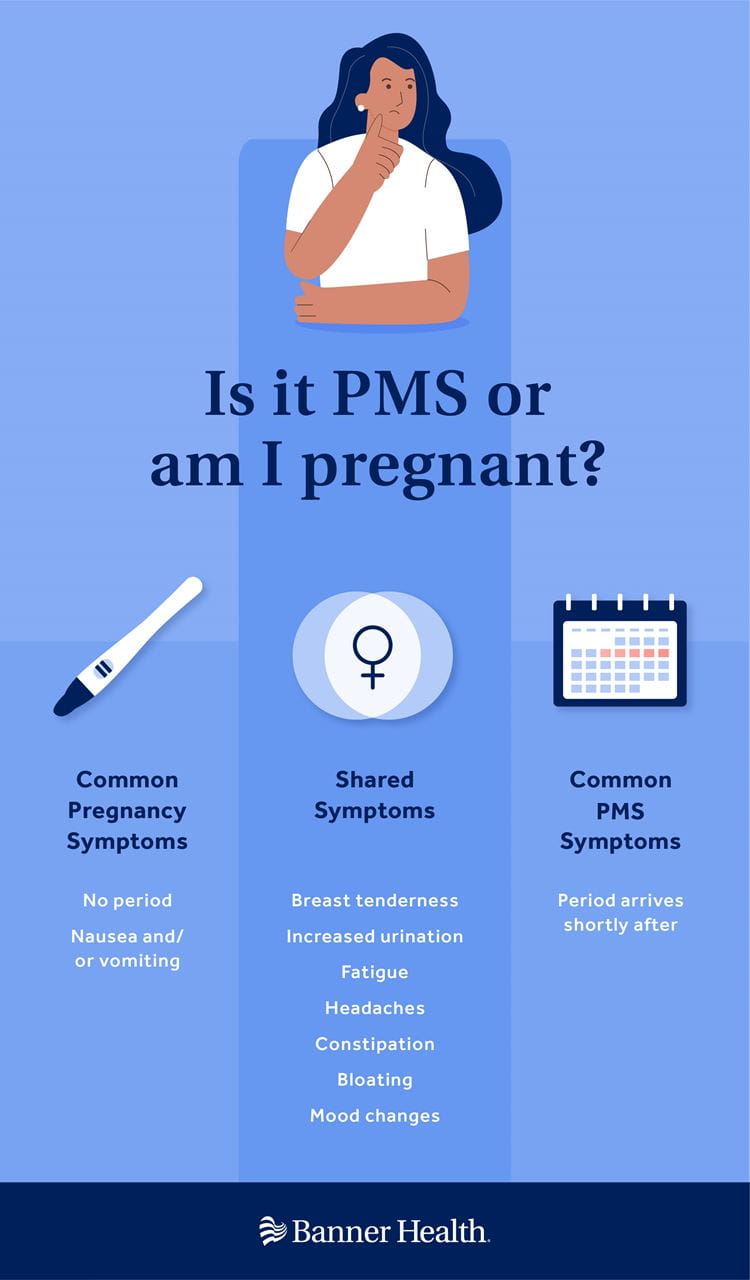Pregnancy and period symptoms often overlap, such as cramping and breast tenderness. Nausea and missed periods are more specific to pregnancy.
Understanding the nuances between pregnancy symptoms and period symptoms can be crucial for women monitoring their reproductive health. Many symptoms like bloating, mood swings, and headaches can appear in both scenarios, creating confusion. It’s essential to recognize that while fatigue and slight bleeding could suggest either condition, symptoms like morning sickness and a positive pregnancy test unequivocally point towards pregnancy.
The subtleties of each condition are important for women to comprehend whether they are anticipating a menstrual cycle or suspecting a pregnancy. Accurate interpretation of these symptoms allows for timely and appropriate action, be it scheduling a doctor’s visit or simply preparing for the upcoming menstrual cycle. Ensuring clarity, this conversation aims to empower women with the knowledge to differentiate between two closely related bodily processes.

Credit: www.healthline.com
Pregnancy Symptoms
Pregnancy symptoms can be both exciting and nerve-wracking for expectant mothers. It’s crucial to recognize and understand these symptoms early on. Knowing what to expect helps manage this life-changing experience better. This section delves into the early signs of pregnancy and the symptoms that commonly accompany it.
Early Signs Of Pregnancy
The first hint of pregnancy often comes even before a missed period. Here’s a quick look at some telltale signs:
- Missed period: Most women notice this as the first sign of pregnancy.
- Tender, swollen breasts: Hormonal changes might make breasts sensitive.
- Nausea with or without vomiting: Often termed as morning sickness, it can strike at any time.
- Increased urination: The need to pee more often is due to changes in the body.
- Fatigue: Feeling overly tired is common due to high levels of the hormone progesterone.
Common Pregnancy Symptoms
Beyond the early signs, other symptoms emerge as the pregnancy progresses. Let’s explore:
| Weeks of Pregnancy | Common Symptoms |
|---|---|
| 1-4 Weeks |
|
| 5-8 Weeks |
|
| 9-12 Weeks |
|
| 13-16 Weeks |
|
As every woman’s body is unique, symptoms might differ. It’s important to consult a healthcare provider for any concerns. Remaining mindful of these changes allows for a smoother journey through pregnancy.
Difference From Period Symptoms
Understanding the differences between pregnancy and period symptoms is crucial for any woman tracking her cycle. Although they might share common signs, key distinctions can help differentiate one from the other.
Physical Symptoms
Pregnancy often brings unique physical changes. Tender breasts in a period might feel sore, but with pregnancy, this soreness is typically more intensified. Nausea is a tell-tale pregnancy symptom, rarely associated with menstrual cycles. Furthermore, pregnancy introduces fatigue levels that are often more pronounced than the general tiredness felt during a period. Spotting could signify implantation bleeding in early pregnancy, differing from the menstrual flow. Body temperatures remain elevated while pregnant, unlike the drop that precedes a period.
- Breasts: Tender in both, often more so in pregnancy.
- Nausea: Common in pregnancy, rare with periods.
- Fatigue: More intense during pregnancy.
- Bleeding: Light spotting can indicate pregnancy.
- Body Temperature: Stays high in pregnancy.
Emotional Symptoms
Emotionally, pregnancy and periods can both trigger mood swings, but the emotional landscape during pregnancy can be much more varied. Pregnant women might experience heightened emotions and mood shifts that are broader in range compared to the irritability or blues often associated with premenstrual syndrome (PMS). An emerging sense of emotional attachment or protectiveness might also hint at pregnancy.
- Mood Swings: Present in both, broader in pregnancy.
- Emotions: More intense with pregnancy.
- Attachment: Feelings of protectiveness may signal pregnancy.
Seeking Medical Advice
Deciphering the difference between pregnancy symptoms and period symptoms can be tricky. While both may share common signs, nuances set them apart. Recognizing when to seek medical advice is pivotal. Women must trust their instincts if they feel something is amiss. Ensuring timely consultation with a healthcare provider can lead to better outcomes.
When To Consult A Doctor
Women should consult a doctor if they experience any unusual signs. These may include:
- Intense cramps that over-the-counter meds can’t soothe
- Spotting or bleeding outside of a normal cycle
- Severe nausea or vomiting impeding daily routines
- Missed periods with a history of regular cycles
- Persistent pain in the lower back or abdomen
- Unexplained fatigue or dizziness
A medical professional may suggest tests to confirm pregnancy or diagnose other conditions.
Understanding The Importance Of Early Diagnosis
Early diagnosis is crucial for managing health during a potential pregnancy or when facing menstrual irregularities. By identifying the root cause early:
- Pregnancies stand a better chance of receiving prenatal care.
- Underlying health issues are treated promptly.
- Women gain peace of mind and reduce anxiety about unknown symptoms.
Remember, early intervention is a key step toward safeguarding reproductive health and well-being.

Credit: uk.clearblue.com
Self-care And Support
Understanding the nuances of pregnancy symptoms and period symptoms can be perplexing. Once recognized, proper self-care and support are vital. Managing discomfort in the sanctuary of your home and seeking emotional support are key steps to maintaining well-being during these times.
Managing Symptoms At Home
Relief from symptoms is paramount for peace of mind and body health. Here’s a straightforward guide:
- Warm baths soothe muscle cramps and elevate mood.
- Healthy snacks like fruits and yogurt can curb nausea and provide energy.
- Regular exercise, such as walking, enhances circulation and reduces stress.
- Hydration with water or herbal teas aids in preventing bloating and fatigue.
- Over-the-counter pain relief should be taken as directed for aches.
- Comfortable clothing reduces pressure on the abdomen.
Remember, home remedies work best with consistent use and a dash of patience.
Seeking Emotional Support
Nurturing your emotional health is just as critical as managing physical discomfort. Don’t hesitate to:
- Communicate openly with friends or family about your feelings.
- Join a support group online to connect with those in similar situations.
- Contact a health professional if symptoms severely impact your mental health.
A strong support network is invaluable for guidance and comfort.
Conclusion And Next Steps
Distinguishing between pregnancy and period symptoms poses a challenge. But knowledge empowers you to act precisely. The mastery of your body’s signals facilitates timely decisions. A proactive approach enhances peace of mind.
Understanding Your Body
Tracking symptoms leads to greater awareness. Familiarity with your cycle is a vital step. Accurate identification of changes can signal significant life events. Note the patterns your body exhibits.
- Menstrual symptoms often include cramps, bloating, and mood swings.
- Pregnancy signs may cover missed periods, nausea, and fatigue.
Changes outside the norm warrant attention. Each body is unique. What is standard for one may be unusual for another.
Preparing For The Next Steps
Identified a shift in your symptoms? Consider the following actions:
- Document symptoms for better discussion with healthcare professionals.
- Take a home pregnancy test if a period is late or symptoms align with pregnancy.
- Schedule a doctor’s appointment for a confirmed diagnosis and guidance.
Gather resources and support systems early. Staying informed ensures readiness for any outcome. Take care of your physical and emotional well-being.

Credit: www.bannerhealth.com
Frequently Asked Questions Of Pregnancy Symptoms And Period Symptoms
How Do You Know If Your Period Is Coming Or Your Pregnant?
Signs of your period coming include PMS symptoms and menstrual cramps. Pregnancy symptoms involve a missed period, nausea, and breast tenderness. A pregnancy test can definitively verify if you’re pregnant.
How Do You Know The Difference Between Period Pain And Pregnancy Pain?
Period pain often precedes or accompanies menstrual bleeding and is characterized by cramping in the lower abdomen. Pregnancy pain may include cramps but is also associated with symptoms like nausea, breast tenderness, and fatigue. Consult a healthcare professional for accurate diagnosis.
Did Anyone Feel Like Period Was Coming But Pregnant?
Yes, some women report experiencing symptoms similar to premenstrual syndrome while they are actually pregnant. These can include cramps, bloating, and mood swings.
Is My Period Late Or Am I Pregnant?
A late period can indicate pregnancy, but other factors like stress or hormonal imbalances can also cause delays. To determine if you’re pregnant, take a home pregnancy test or consult your healthcare provider.
Conclusion
Navigating the overlap of pregnancy and period symptoms can be a tricky affair. Recognizing the distinct signals your body sends is crucial. Trust your intuition, note the nuances, and when in doubt, consult a healthcare professional. Remember, awareness and understanding are your best allies in deciphering these bodily cues.
Stay informed, stay healthy.